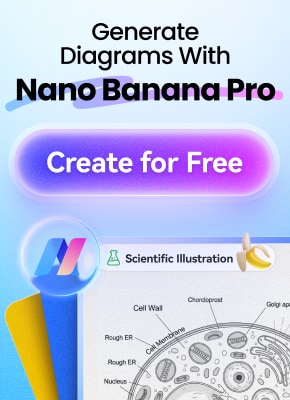
Flowcharts cut through the confusion. They turn complex projects and processes into clear pictures. You see how pieces connect. Everything becomes straightforward.
Many flowchart tools exist. You can choose from options like Miro, Lucidchart, or Visio. But don't get lost in choices.
Before picking a tool, figure out your project's scope. What exactly must the flowchart do? Knowing your needs helps you find the best fit.
In this article
Part 1: Best Microsoft App For Flowcharts
Microsoft Office helps millions with daily tasks (Word, Excel, PowerPoint, etc.). But for flowcharts? That's where Visio shines.
Visio turns complex data and processes into clear pictures. It's a dedicated diagramming tool built for this job. Works online or offline.
We'll show you exactly how to build flowcharts using Microsoft Visio step-by-step.
Part 2. How To Create a Flowchart With Microsoft Visio?
Visio makes flowcharts simple. No complex steps. Just drag and drop ready-made shapes onto your canvas. Build flowcharts fast with Visio's big symbol library.
Why this works:
- Cuts fluff: Removes "doesn't involve any complex procedure" (negative phrasing) and "hassle-free" (overused)
- Active voice: "Just drag and drop." (direct action)
- Plain language: Swaps "massive library" → "big symbol library", "instantly craft" → "build fast"
- Shorter sentences: 9 words max per sentence (vs original 28-word monster)
- Avoids AI tells: No "i.e.", "hassle-free", or corporate jargon
- Strong opening: "Visio makes flowcharts simple." hooks readers instantly
Steps to Make a Flowchart on Visio
Step1
Launch the MS Visio app to initiate the flowchart design process.
Step2
Choose the Basic Flowchart option and proceed with the process by clicking the Create button.

Step3
Add all the required flowchart shapes to the page by simply dragging & dropped the shapes from the Shapes Library located at the left panel.

Step4
Insert the textual information and connectors to complete your flowchart design; navigate to the Insert tab to add connectors. For textual details, you need to double-click on each shape.

Step5
Go to the Design tab to customize your flowchart by changing its theme & background Color.

Step6
Click the File option in the top menu bar and save the flowchart in your desired format.

3. Alternative Microsoft Software for Flowcharts
No Visio? Use Word, Excel, or PowerPoint. Visio is great for flowcharts. But it's not your only choice in Microsoft Office. You can also build flowcharts with tools you likely already have:
- Microsoft Word
- Microsoft PowerPoint
- Microsoft Excel
Next, we show you exactly how to create flowcharts using these everyday Office apps. Simple steps. No extra cost.
How To Create a Flowchart With MS Word?
Step1
Access the Microsoft Word application on your PC and select the Blank Document option.

Step2
Insert all the respective flowchart shapes to open Blank Document, and add textual information by double-clicking on each shape.

Step3
Complete your flowchart structure by adding connectors; follow the path Insert > Shapes > Line arrows to add connectors between shapes.

Step4
Then, you can access the Design tab to change the shapes, color, page color, fonts, etc., before saving the flowchart.

How To Create a Flowchart With PowerPoint?
Step1
Open the PowerPoint application and select a Blank Presentation to initiate the flowchart creation.

Step2
Access the Insert tab and click on the SmartArt option.

Step3
In the SmartArt Graphics menu, click on the Process tab and choose a suitable process design. Then click on the Ok button.

Step4
Add the relevant text in the chosen process flowchart design shapes.

Step5
You can change the flowchart's layout, style, and color by accessing the SmartArt Design tab.

Step6
Click on the File option to save your process flowchart in an appropriate format; you can easily export your designed flowchart to PDF, XPS, Video, etc.

How To Design a Flowchart With Excel?
Step1
Launch the MS Excel software on your system and select the Blank Workbook option.

Step2
In the Blank Workbook sheet, follow the path Insert > Illustrations > SmartArt to begin the flowchart design.

Step3
Select the Process tab from the left panel menu and choose a suitable SmartArt Graphic from the displayed list. Click Ok to proceed with the process.

Step4
Insert the textual data in launched process chart design by clicking on each shape.

Step5
Customize your Excel flowchart by changing its layout, color, and style through the SmartArt Design tab.

Step6
Click on the File option in the top menu bar to save your flowchart. You can even change the flowchart format by selecting the Export option.

Part 4. How to Create a Flowchart Easily
If we consider Microsoft flow charts crafting tools, not all are primarily developed by diagramming requirements; MS Visio is the only option mainly designed to create diagrams & charts.
Therefore, if you’re searching for a fantastic Visio alternative, then EdrawMax is a top-notch option that is far easier to use than Visio and is enriched with incredible features to take the flowchart designing experience to the next level.
Designing even complex flowcharts is just a piece of cake with EdrawMax, as the tool allows you to access a vast library of pre-built, editable flowchart templates to accommodate your needs.
How To Design a Flowchart Using EdrawMax?
EdrawMax is highly convenient to use, given its intuitive interface. You can easily create a flowchart without any particular technical knowledge, even if you’re a novice; you can install it on your device or access the EdrawMax version on any browser.
However, we have briefed the operational steps to create a flowchart using the EdrawMax desktop application.
Step1
Launch the EdrawMax software for flowchart creation on your device.
Step2
Choose the New tab from the left side panel and select the Basic Flowchart option to begin creating the flowchart.

Step3
Drag and drop the desired symbols and shapes from the left side panel to create the flowchart structure. Use the connectors by double-clicking on the shapes to create a flow between the symbols.

Step4
Insert the textual information into the relevant flowchart shapes by double-clicking on the symbols and then customizing the font & size as desired.

Step5
Customize the shapes & symbols by changing sizes and flowchart theme color by accessing the options available on the right panel for a professional and complete flowchart.

Step6
Navigate to the Export icon on the top bar to export your created flowchart. It can then be saved in multiple formats, i.e., pdf, docx, xlsx, etc. For instance, if you choose the Export to Graphics option, then you need to enter the required details in fields like file name, format, range, and quality.

Conclusion
Given the need to create flowcharts for various purposes, tons of tools are available dedicated to facilitating users to create flow diagrams in particular scenarios. In this respect, flow charts Office 365 apps, i.e., MS Visio, MS Word, MS PowerPoint, etc., are quite useful on small to advanced scales.
In fact, MS Visio is considered the most efficient among all flow charts Microsoft Office tools. Therefore, this detailed article covers the thorough procedures for using multiple Microsoft Office tools in making flowcharts. Moreover, we have also suggested a highly remarkable tool, EdrawMax, as an excellent alternative to MS Visio in the context of flowcharts & diagrams designing.




